Meet the utterly sincere Fallout YouTuber who found his calling visiting the series' real-life locations wearing a Vault Boy head
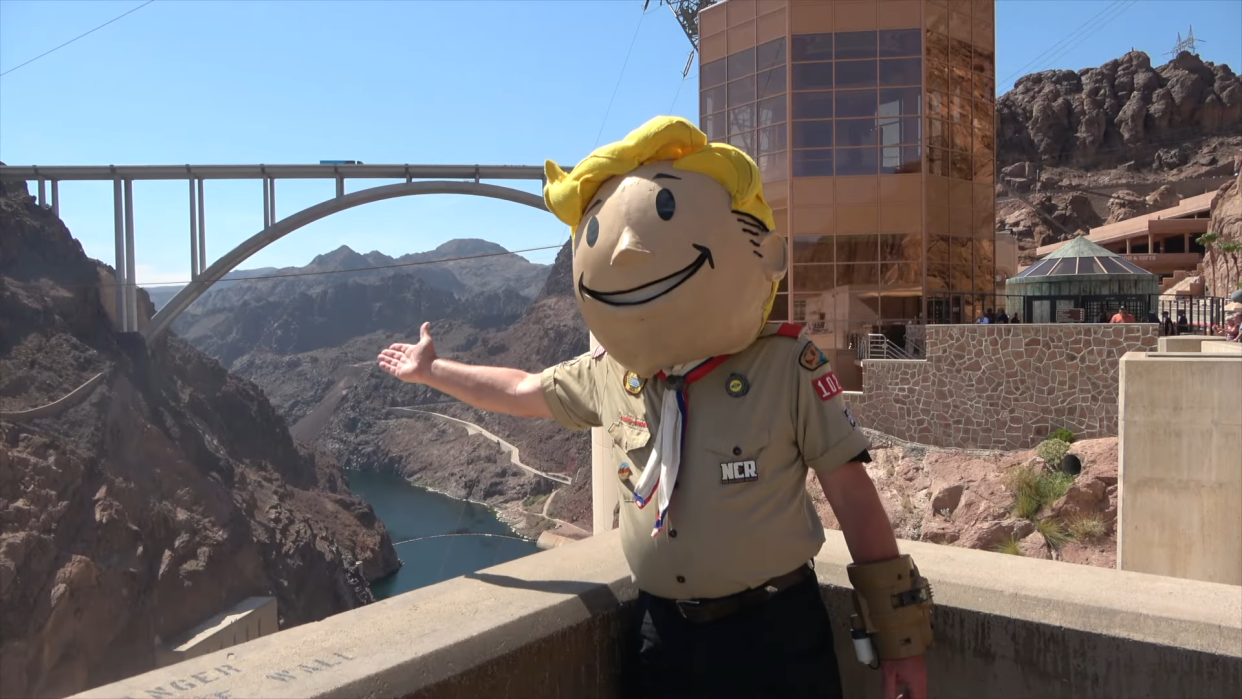
When Brian 'Chip' McLaughlin dons his Boy Scout uniform and pulls on his Vault Boy head, pandemonium ensues. At Fasnacht this year—a real-world Swiss-American costume celebration also held in Fallout 76—he almost missed the parade after an hour taking photos with Fallout fans. And the Vegas strip was even crazier.
Road Chippin' has the genial, low-key vibe of a Sunday afternoon docuseries
"The Fallout fans are waving and talking and taking pictures," he says. "We're in front of the Bellagio, and up comes this guy dressed as Goofy, and he stands right next to me. And I'm like, 'Oh my god, I'm about to get shanked by Goofy. This is their turf, and I didn't realise it.'"
More worrying still are the pensioners, who have stared at McLaughlin with scorn at more than one tourist site. To their eyes he looks like a Hitler Youth with a Trump head. But the occasional misunderstanding is worth it. "I love it," McLaughlin says. "Because I love the fans of the game, and they're everywhere you go."
McLaughlin's YouTube channel The Chip Monk Show, in which he visits locations from the Fallout games looking like a living bobblehead, grew from an unlikely source: professional disappointment.
From the age of 11, back when he made films with a Super 8mm camera, McLaughlin had wanted to break into Hollywood. As he reached adulthood he made some headway as a writer, scripting sitcoms. "A friend was a producer on Saved by the Bell," he says. "She hooked me up with an agent who had just left Disney. I wrote a lot of spec work and non-produced stuff." At the time, though, reality TV was peaking in the United States and laid waste to the landscape of scripted comedy and drama. "That's typical of my life," McLaughlin says. "When I get to the point where I'm really going strong and I've got everything in place, some unknown force just devastates it."
Nevertheless, he persisted, using his new contacts and experience to set up an independent production company and shift towards bigger and bigger projects. "I did do two TV pilots which didn't get picked up, but that's OK," he says. "It moved me into position to do my final project, which is a big Pony Express feature film. I had wanted to do it since I was a kid."
After six years of script development, McLaughlin had started putting together a seed budget for his reboot of the Charlton Heston-starring Western. "Right when everything was ready to go, all the contracts were signed and we were ready to start the financing phase, Covid hit," he says. "It just came to a grinding halt. That was devastating."
With the pandemic unfolding in earnest, McLaughlin and his wife began a playthrough of Fallout 76 with a friend. One night, he turned off his HUD to see what the game looked like when stripped of its heath bar, ammo count and various quest trackers. "Oh my god," McLaughlin realised: "Your character is a camera."
From there, he did something only a frustrated scriptwriter would think to do: plug in an external hard drive and start recording footage for a sitcom. That decision triggered what he says is "the most free and creative time I've ever had in my life."
West Virginia, mountain machinima
McLaughlin invented The Chip Monk Show, a dark comedy starring a plucky Pioneer Scout with an oversized Vault Boy head fused permanently to his body. After years of butting up against funding problems, the writer had finally found a place where the cameras, costumes and locations all came for free. Inadvertently he'd discovered the magic of machinima. "We can tell stories," he says. "We can have fun. There's no pressure, there's no stress, there's no financial impact."
Now deep into its third season, The Chip Monk Show retains the lo-fi voice acting and homemade editing style it began with—though by this point its characters have cracked wise against the backdrops of The Elder Scrolls Online and Red Dead Redemption 2 as well as Fallout. It remains McLaughlin's great passion, despite the fact that, by his own admission, it's a hard sell.
"Gamers are like, 'Well, I don't like it, because it's not lore, it's not what happens in the game," he says. "For some reason, people can't seem to separate machinima from the gaming experience, which is weird to me." Much more popular is The Chip Monk Show's spinoff, a travel series in which McLaughlin takes on the role of his star and tours the states that have featured in Fallout games.
Road Chippin', as the travel show is named, is a charmingly earnest watch. McLaughlin wears his enormous bobblehead throughout—a styrofoam pumpkin that has been shaved down, painted, and topped with a great big ice-cream scoop of yellow felt hair. To answer the most common question he gets: No, he's not completely blinded by his headwear. In fact, he looks out through a white mesh in Chip Monk's mouth. "When I'm walking down stairs, it's a little scary," McLaughlin says. "But I can see OK, and it's comfortable to wear for the most part."
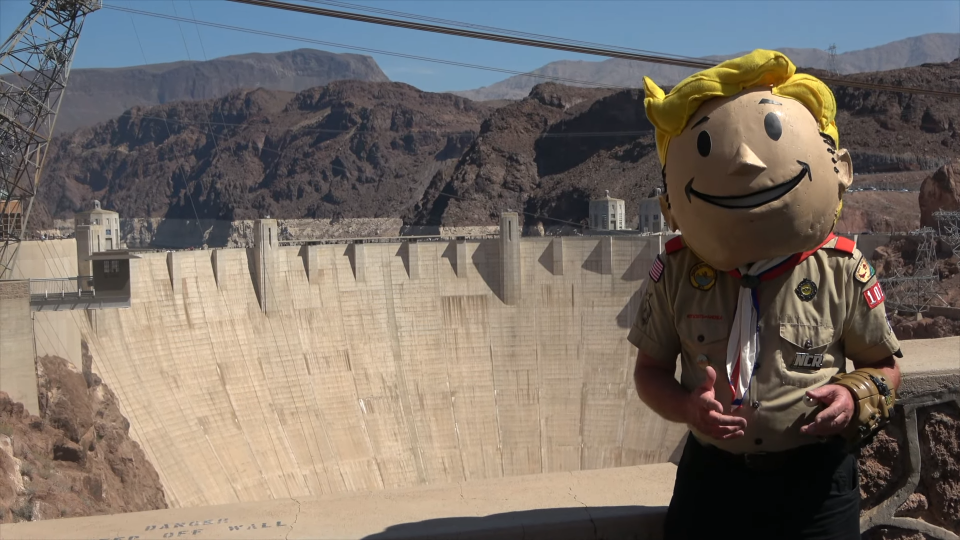
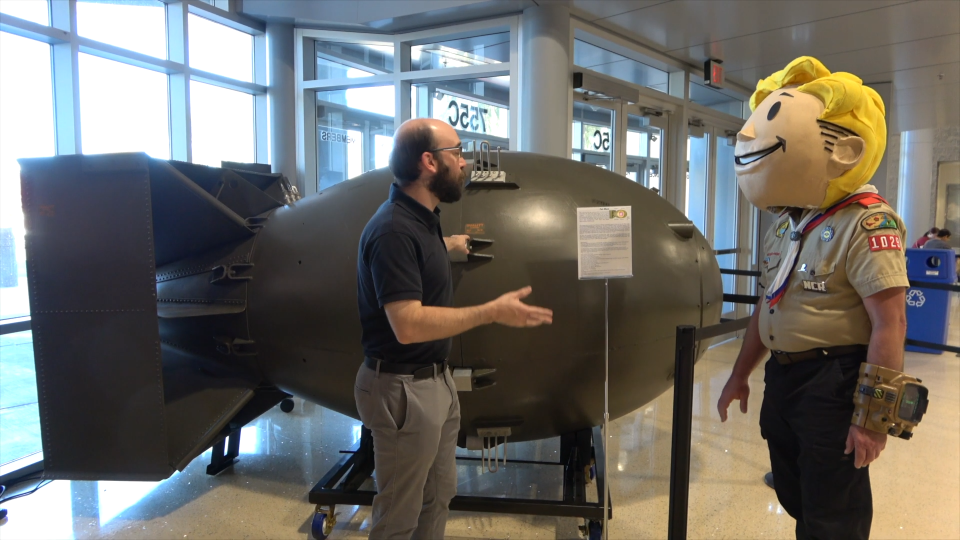
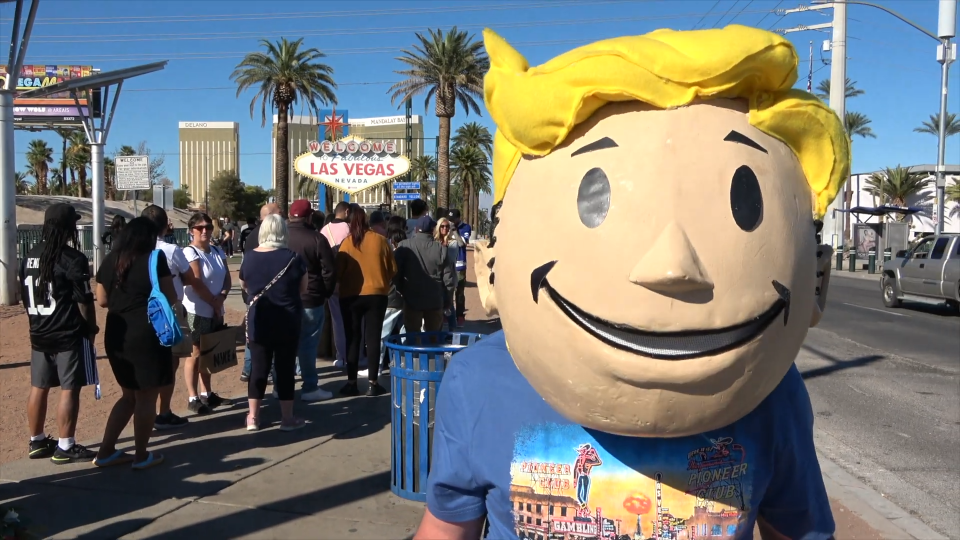
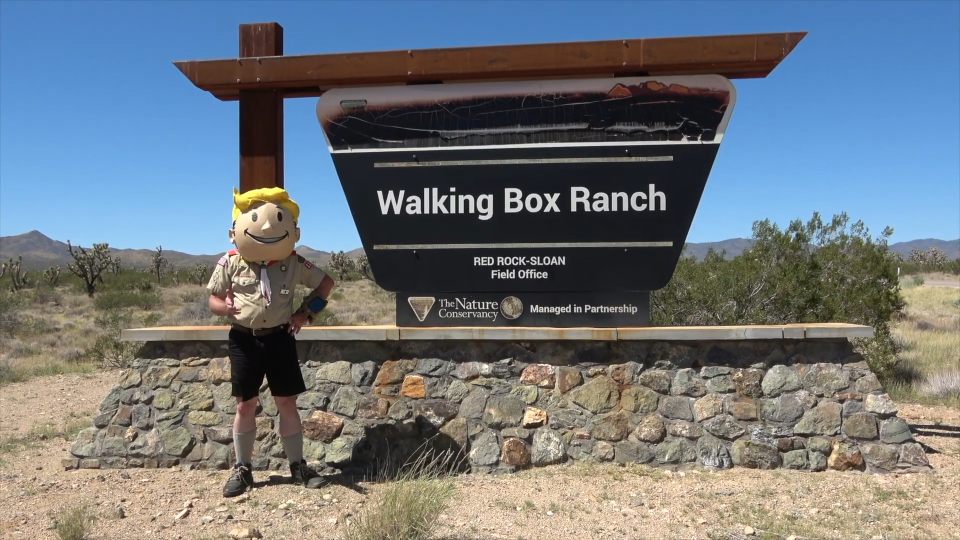
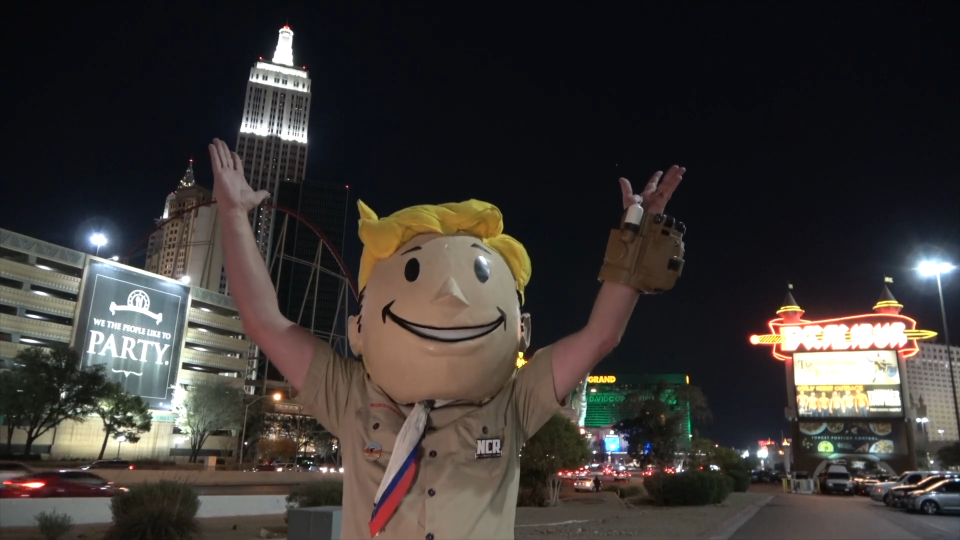
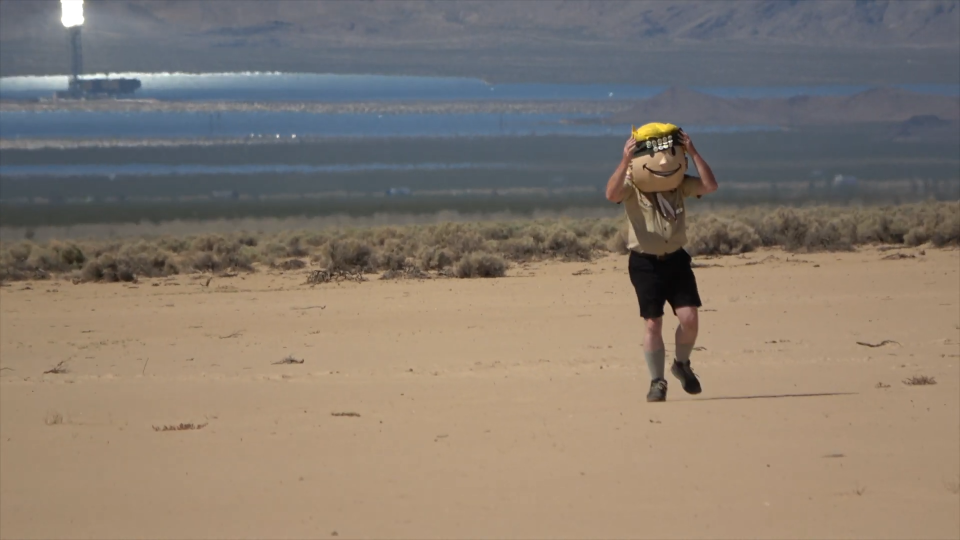
Despite the goofy costume, McLaughlin isn't out to prank or poke fun at anyone. His comedy is good-natured and self-deprecating, and only really a delivery method for the local discoveries he's excited to share with viewers. Road Chippin' has the genial, low-key vibe of a Sunday afternoon docuseries on terrestrial television, stuffed with historical breakdowns and interviews with regional experts.
The highlights of the show, however, are invariably the moments when McLaughlin spotlights just how faithful the Fallout games are to their real-life inspiration. That's especially true of the hub locations in Fallout 76. "To go to the Whitespring Hotel, or the Greenbrier, it's overwhelming to the senses," he says. "You go in there, and down to the vases, the colour schemes, the layout, the dimensions, it's represented in-game. Everywhere I went in West Virginia, I just kept encountering that over and over at every location. I really wanted to celebrate the work that the designers do—to me they're unsung heroes."
In lesser hands, an episode on West Virginia's Allegheny Asylum—better known as Fort Defiance to Brotherhood of Steel members—might lean into ghost stories and cruel clichés about incurable mental illness. Instead, McLaughlin presents the findings of his research with real sensitivity. "I had no idea how controversial this place was," he admits. "And it's like, 'Oh my god, do I just scrap the episode, or do I try and make this work? How can I take such serious subject matter and throw Chip Monk into this?'"
McLaughlin wrestles often with this tonal balance—which in many ways is the same tonal tightrope the Fallout series walks itself. In Road Chippin', as in the games and the Amazon show, the levity and absurdity of the naive vault dweller at the centre is crucial. It's the comedy that lets you sit with the horror of nuclear war, as well as the uncomfortable real-world history that Fallout feeds off. If the function of post-apocalyptic art is to let us process the possibility of our extinction, then the ironically smiling face of Vault Boy is what makes that process palatable. Fun, even.
"That is exactly why I made the character and wear the mask," McLaughlin says. "My favourite element of Fallout is the Vault Boy, duck-and-cover layer. It blows your mind that during the '50s and '60s in American history, that is what they marketed this into. It's horrifying, but it's hysterical at the same time. That is Vault Boy in a nutshell."
McLaughlin's own riff on Vault Boy, Chip Monk, was from the beginning a radical optimist—just like Lucy in the Fallout show. "He thinks he can rebuild the world the way it was," McLaughlin says. "By the end of the show, he comes to the realisation that the best he can do is be an example of what is good in people. Fallout itself really embodies that—there's hope. It may not be realistic, but you'll die living that, and that's a better way to be in my opinion."


